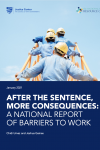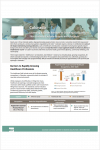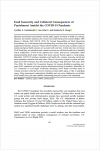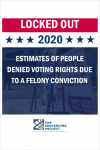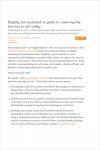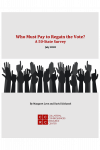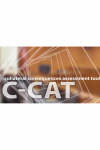Resources
"Search Results" - 163 item(s) found.
-
The Council of State Governments Justice Center
(January 2021)This report from presents national and state-by-state overviews of the nearly 30,000 state and federal consequences of conviction that directly block people from being hired or create barriers to obtaining occupational licenses essential for certain jobs. -
Reuben Jonathan Miller, Politico
(December 2020)In this Politico Magazine article, the author highlights that thousands of state and federal laws and regulations make it almost impossible for people who were formerly incarcerated to fully reintegrate into civilian life, "trapping these individuals in a state of quasi-citizenship that makes it more likely they will be sent ... -
Beth Avery and Han Lu, National Employment Law Project (NELP)
(December 2020)According to the National Employment Law Project (NELP), workers with records are calling on employers and policymakers across the country to remove unfair barriers to working and supporting their families and communities. Given the confusing tangle of occupational restrictions across the nation, reformers may consider strategically focusing their efforts on ... -
Cynthia A. Golembeski, Ans Irfan, and Kimberly R. Dong, World Medical and Health Policy
(December 2020)This article from the highlights the struggles individuals with felony drug convictions face in accessing relief with food stamps or Supplemental Nutrition Assistance Program (SNAP benefits). The authors find that policy improvements, administrative flexibility, and cross‐sector collaboration can facilitate SNAP benefit access, plus safer, healthier transitioning from jail or prison to the community. ... -
Chris Uggen, Ryan Larson, Sarah Shannon, and Arleth Pulido-Nava, The Sentencing Project
(October 2020)In the past 25 years, half of the states have changed their laws and practices to expand voting access to people with felony convictions. Despite these important reforms, 5.2 million Americans remain disenfranchised, 2.3 percent of the voting-age population. This Sentencing Project report is intended to update and expand the organization's ... -
Ginger Jackson-Gleich and Rev. Dr. S. Todd Yeary, Prison Policy Initiative
(October 2020)According to this article from the Prison Policy Initiative, most people in jail are legally eligible to vote, but in practice, they cannot. This “de facto disenfranchisement” stems from numerous factors, including widespread misinformation about eligibility, myriad barriers to voter registration, and challenges to casting a ballot. The article explains who in ... -
Collateral Consequences Resource Center
(July 2020)This report examines the extent to which state reenfranchisement laws consider payment of legal financial obligations (LFOs), including fines, fees, and restitution, in determining whether and when to restore voting rights to people disenfranchised due to a felony conviction. The research in the report shows that in nearly half the states ... -
University of North Carolina School of Government
(June 2020)The Collateral Consequences Assessment Tool, or C-CAT, provides a link to resources for those who regularly work with people involved with the criminal justice system in North Carolina, both before and after disposition. North Carolina statutes and regulations require or authorize a wide array of collateral consequences and civil disabilities ...
